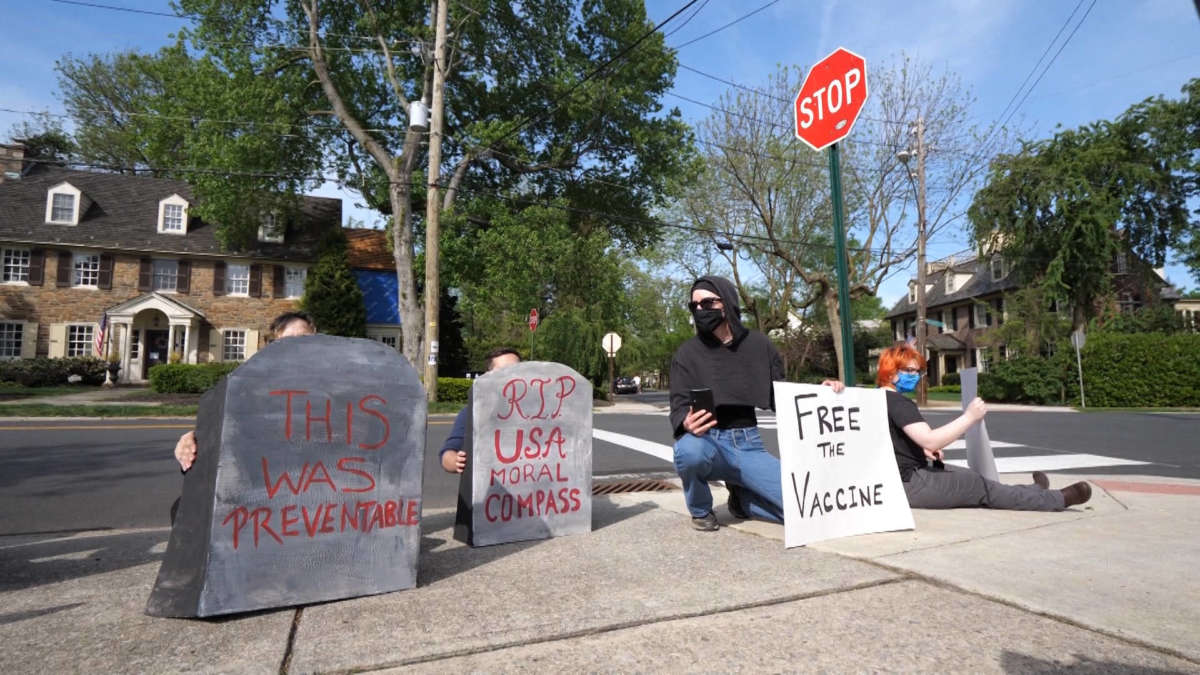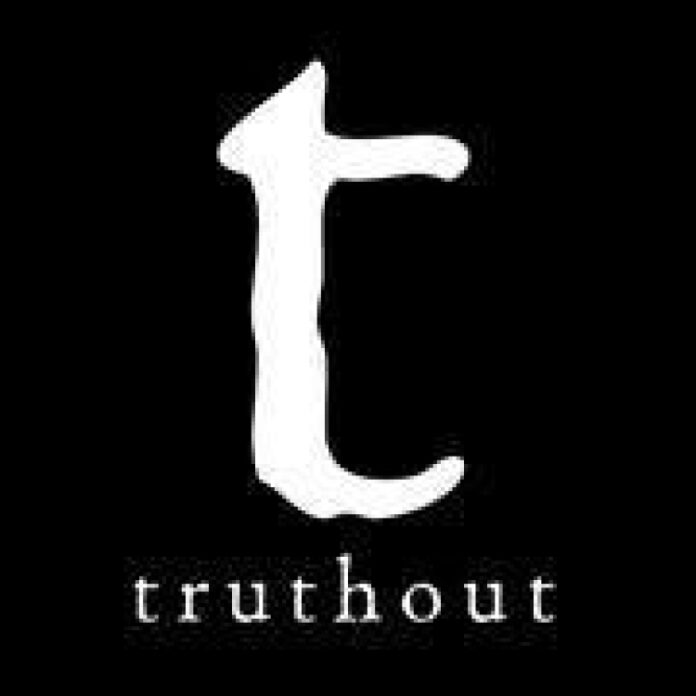
Jailers Tortured and Murdered Marvin Scott III, Family Says After Viewing Video
A New Wave of Jim Crow Laws Is Here. Here’s What You Need to Know.
Facebook Board Announces Trump Remains Banned. Trump Starts His Own “Platform.”
Amazon Is Dictating Personal Hygiene, Nail Length of Contract Drivers
Judge Says DOJ Memo on Barr’s Decision Not to Charge Trump Must Be Released
Pressure is growing on the Biden administration to support a temporary waiver on intellectual property rights for COVID-related medicines and vaccines at the World Trade Organization. India and South Africa first proposed the waiver in October, but it was blocked by the United States and other wealthy members of the WTO. Big Pharma has also come out against the proposal and has lobbied Washington to preserve its monopoly control. More than 100 countries have supported the waiver, which they say is critical to ramp up production of vaccines, treatments and diagnostic tests in the Global South. Ahead of the kickoff of two days of WTO important meetings in Geneva, we speak with Lori Wallach of Public Citizen’s Global Trade Watch. “The big problem is simply not enough vaccines are being produced,” says Wallach. “The world needs 10 to 15 billion doses to reach herd immunity, and right now all of the global production together is on track to make 6 billion doses this year.”
TRANSCRIPT
This is a rush transcript. Copy may not be in its final form.
AMY GOODMAN: This is Democracy Now!, democracynow.org, The Quarantine Report. I’m Amy Goodman. You can sign up for our daily news digest email by texting “democracynow” — one word, no space — to 66866 today. That’s “democracynow” — one word — to 66866. This is Democracy Now!
Pressure is growing on the Biden administration to support a temporary waiver on intellectual property rights for COVID-related medicines and vaccines at the World Trade Organization. The WTO has just begun two days of talks in Geneva. India and South Africa first proposed the waiver in October, but it was blocked by the United States and other wealthy countries of the WTO. Big Pharma, the pharmaceutical companies, have also come out against the proposal and has lobbied Washington to preserve its monopoly control. Supporters of the waivers say they’re critically needed to gear up the production level of vaccines, treatments and diagnostic tests so desperately needed in the Global South. More than a hundred countries have supported the waivers at the WTO.
The majority of House Democrats here in the U.S. have also signed a letter to Biden urging him to back the waivers. The letter reads, in part, “Your Administration has an incredible opportunity to reverse the damage done by the Trump Administration to our nation’s global reputation and restore America’s public health leadership on the world stage,” unquote.
On Sunday, Senator Bernie Sanders voiced support for the waivers during an appearance on Meet the Press.
SEN. BERNIE SANDERS: We should deal with this issue through the World Trade Organization of protecting the intellectual property rights of the drug companies. And I think what we have got to say right now to the drug companies, when millions of lives are at stake around the world, yes, allow other countries to have these intellectual property rights so that they can produce the vaccines that are desperately needed in poor countries. There is something morally objectionable about rich countries being able to get that vaccine, and yet millions and billions of people in poor countries are unable to afford it.
AMY GOODMAN: This all comes as Pfizer has just announced its COVID-19 vaccine brought in $3.5 billion in revenue in the first three months of 2021. Pfizer expects to make $26 billion in revenue this year.
Joining us in Washington, D.C., is Lori Wallach, director of Public Citizen’s Global Trade Watch. She and Nobel Prize-winning economist Joseph Stiglitz recently co-wrote a piece in The Washington Post headlined “Preserving intellectual property barriers to covid-19 vaccines is morally wrong and foolish.”
Explain why, Lori. And explain what needs to be done.
LORI WALLACH: Good morning.
The big problem is simply not enough vaccines are being produced. And that’s because a handful of vaccine-originating pharmaceutical corporations have monopoly control over the production, and they’re unwilling and have actually rejected requests from qualified manufacturers around the world to pay them to be able to make more doses. The world needs 10 to 15 billion doses to reach herd immunity, and right now all of the global production together is on track to make about 6 billion doses this year.
So, at issue is a proposal that India and South Africa put forward in October at the World Trade Organization. The World Trade Organization has rules, in a thing called the Agreement on Trade-Related Aspects of Intellectual Property — it’s called the TRIPS Agreement, for short — that requires all of the WTO members to guarantee the pharmaceutical companies monopoly control of production. So the proposal is simply to temporarily, for the COVID emergency, waive four parts of that agreement that cover the four specific types of intellectual property now protecting the vaccines from being made in greater volume, as well as treatments and diagnostic tests, and basically to allow countries around the world to have producers make, in each region, enough vaccine so everyone can actually get vaccinated.
It’s not just the morally necessary thing to do, with millions of lives at stake; it is selfishly in the interest of the United States, because we can vaccinate everyone. And the Biden administration is doing a great job, but if there is any outbreak anywhere, it’s where vaccine-resistant, more deadly, more infectious variants of the virus can hatch. And we’ll all end up in a global lockdown if we don’t get everyone immunized in shorter order.
AMY GOODMAN: So, can I ask you about the Biden administration’s links to Big Pharma? Many ties to the vaccine makers: the White House adviser Anita Dunn, co-founder of the consulting firm SKDK, which works closely with Pfizer; Biden’s domestic policy adviser Susan Rice holds up to $5 million in Johnson & Johnson; White House science adviser Eric Lander holds up to a million dollars in shares of BioNTech, which co-developed Pfizer’s coronavirus vaccine. On Monday, I spoke to The Intercept’s Lee Fang about the ties and also about the Albright Group, that many in Biden’s inner circle come from. This is what he said.
LEE FANG: The fact that the number three, four undersecretaries of the State Department were at a consulting firm, Albright Stonebridge Group, that represented Pfizer, that Anita Dunn — you know, she’s not someone who’s mentioned a lot in the media recently, but she’s one of the closest advisers to the Biden administration. She was the de facto campaign manager for his presidential campaign. Her consulting firm represents Pfizer, engages in a lot of the PR and advertising for that firm.
These are serious conflicts of interest, and they deserve some scrutiny, given the fact that Pfizer is looking at this product, this vaccine, as its massive moneymaker. One estimate shows that Pfizer’s coronavirus vaccine, under even the kind of negotiated prices that are deeply discounted this year for U.S. consumers, that will bring in something like $15 billion a year, making it one of the highest-grossing pharmaceutical products of all time. And they’re already talking about raising prices. So, Pfizer, Moderna, Johnson & Johnson, they have so much money at stake. They’re leaning on lobbyists, they’re leaning on former Democratic aides and on potentially some of these folks who they have ties with in the White House, to push back on any effort to allow a generic vaccine.
AMY GOODMAN: So, there you have Lee Fang of The Intercept. Your response to this sort of cocoon of — you know, Eisenhower talked about the military-industrial complex — the drug-industrial complex in this country, the pharmaceutical-industrial complex? Is Biden and his inner circle protecting their benefactors?
LORI WALLACH: Here’s the bottom line. This decision is going to be made by President Biden. And President Biden, personally, to the camera, directly, promised America, in a conversation with Ady Barkan, heroic, challenged by ALS, healthcare activist, super activist, that he would not allow the intellectual property rights of Pharma to interfere with the world getting access to these vaccines. And throughout Congress, throughout the activist world, the Vatican, everyone is saying to Biden, “Mr. Biden, deliver on this promise.”
Whomever he is surrounded by, regardless of what is truly a tsunami of Pharma lobbyists — they’re here all the time. Amy, they have a ratio where they have one lobbyist for every 20 members of Congress. It’s not just that we all are running around as citizens trying to get our members of Congress to do something; they are so thick on the ground that they’re always trying to get their way. But here’s the difference. Sixty percent of the U.S. public, as divided as we are, has said absolutely there should be a waiver. The opposition to it in the U.S. is minuscule. To some degree, if you’re not for it, it’s because you don’t know about it. It’s not rocket science. It is a first critical step to having the chance to end this pandemic as quickly as possible. So it’s on Biden to follow through regardless of who is speaking in his ear. And many people in the administration, by the way, are for the waiver.
So, today in Geneva, the U.S. is going to have to take a position. And here’s what’s the worst piece of this whole thing. They’re not blocking adoption of a specific waiver. Since October, starting with Trump, the United States of America has blocked more than 100 other countries merely having a negotiation about the text of a waiver. We have stopped the negotiations. The WTO works by consensus. To launch a new negotiation, you can’t have any major country blocking it. The U.S. blocked it. The European Union and Switzerland and the U.K. snuck up behind and said, “Us, too.” So, as soon as the U.S. gets the hell out of the way — that’s all we’re saying: Stop blocking the negotiations. Because there is a text. It’s a draft. If there are problems in it, the negotiations can address specific problems. That then needs to still be adopted. The U.S. doesn’t have to be the cheerleader for it. They need to get out of the way.
What is the look of the U.S.? Thanks to the Biden administration stepping up, we’re all going to — anyone who needs a vaccination and wants one will have one by the summer. And yet we are the country that is going to block a hundred-plus countries being able to do the initiative they say is necessary for them to have the same thing we already have. And the only potentially upset party is a handful of Pharma companies that got billions in our taxpayer money. They had no risk in this. They got billions in advance. And then they’re making billions, as Lee Fang said. So, in this moment, it is not just the morally right thing; it is the only thing to be done to stop the pandemic, is to get vaccines into everyone. And this waiver is part of the answer to that.
AMY GOODMAN: And yet you have people like — well, one of the Democrats backed by Big Pharma who opposes signing the waiver is the senator from President Biden’s home state, Delaware, his very close ally, Chris Coons. Coons ranks 16th among congressional recipients of pharmaceutical industry lobbying money. During an address last month to the Washington think tank Center for Strategic International Studies, he echoed the drug companies’ talking points. When Senator Coons refers to IP, he means intellectual property. This is what he said.
SEN. CHRIS COONS: If we were to simply open up to the world all of the IP at the core of these groundbreaking developments, I think we would then be at risk of losing the private sector investment and development that’s critical to this moment of personalized medicine, of breakthrough vaccines, of breakthrough medical diagnostics. And I think, frankly, the world would suffer as a result.
So, as I said, I don’t think that waiving IP rights will suddenly enable other countries the ability to ramp up the manufacturing of complex vaccines. Instead, I am urging that the Biden administration and the private sector work together in a coordinated effort to manufacture, distribute and administer vaccines rapidly and equitably globally. …
Let me close by being optimistic about our ability to invest in innovation, science and competitiveness here in the United States. … A central part of being successful in this competition is continuing with our constitutionally created, protected — protected property right of a patent, something I’ve long believed in.
AMY GOODMAN: So, that’s Democratic Senator Chris Coons of Delaware. Your response, Lori Wallach?
LORI WALLACH: There are some outliers, who are corporate-funded Democratic hacks, about this. There’s no doubt about it. There are a couple in the House, as well. The bottom line of all of this is the vast majority of Americans, of Democratic members of Congress, of countries around the world, don’t buy that ridiculous argument.
I mean, one very important thing, separate from just the moral imperative of, you know, we’re — if this were a movie, this is where we’re facing the zombie apocalypse. Everyone is going to die, yet there is a solution, if greed can just be gotten out of the way — to just cut to the chase of what is going on here.
But this sort of thinking that he has is premised on just a false claim that the mRNA, this terrific, new, newly exploited technology for the vaccine, is somehow U.S. technology. Number one, it’s not new. The original breakthrough was by a Hungarian scientist in the early ’80s. And, number two, it’s not U.S. So, the patent, that is the Pfizer drug’s key mRNA technology, is held by two Turkish people who live in Germany. That’s the BioNTech company. But also, around the world, this research has been happening. So, for instance, right now in third-stage trials, China has its own mRNA platform vaccine underway. The Pfizer-BioNTech vaccine is being made under contract for Chinese use by a Chinese firm.
So, this sort of nationalistic notion of “it’s ours, and we shouldn’t share,” in the face of death and destruction — by the way, Senator Coons, destruction of the U.S. economy, that is so integrated in the global economy. If you want to just be crass about it, look at the International Chamber of Commerce study that said under a scenario where rich countries are vaccinated but developing countries aren’t, in 2021, the global losses to the global economy, $9.2 trillion — with a T, trillion — half of it in the rich countries. This is avoidable if we can get herd immunity vaccination and end the pandemic. And that is not going to happen unless more vaccine is made.
Is part of where it should be made here? Absolutely. We should make as much as we can here, and we should send it elsewhere. But it will not be sufficient. The World Health Organization, scholars around the world agree. There need to be regional hubs — we can help fund them — but they need access to the technology, the recipes, the know-how to be able to make these drugs.
Just yesterday, at a high-level webinar, the ambassadors from India and South Africa repeated data that’s been in lots of U.S. publications. A billion more doses could be made now, in the shorter term, in months, if this information — if the waiver happened and the information was public, because there’s unused existing capacity in Global South producers that are top-notch, already highly qualified, make very technical biologic drugs for AIDS, the HPV vaccine, etc. So, already in the short term, more can be made, but there’s going to have to be investment, in the U.S., around the world, to have more production capacity. And the first step is getting the information, which, by the way, Amy, we already paid for. One hundred and ten billion dollars globally have been invested, have been transferred to the pharmaceutical industry from governments, in the U.S., in Europe, and yet we don’t have the vaccines we need.
AMY GOODMAN: And they are deploying that in lobbying Congress. And let’s not forget the media. Coons’ speech won him rare accolades from the editorial board of The Wall Street Journal, which wrote it hoped President Biden, quote, “ignores the left and heeds Mr. Coons.” You have The Washington Post coming out with a piece against the waiver yesterday, an editorial. And then you have White House coronavirus adviser Dr. Anthony Fauci, who also just weighed in against the waivers, telling the Financial Times, “Going back and forth, consuming time and lawyers in a legal argument about waivers — that is not the endgame. People are dying around the world and we have to get vaccines into their arms in the fastest and most efficient way possible.” Lori, your response?
LORI WALLACH: I was on a call last week with Dr. Fauci. And actually, he says that, and he says that after “Of course we need to do a waiver, but we can’t waste all our time fighting over the waiver.” There are so many other steps. Yes, we need to share the know-how, and then we need to get the investment, and then we need to get the different centers around the world going, and then we have to get the companies to actually share the know-how. So, there has been an effort, for a month, by the pharmaceutical industry to make it seem like Fauci is against the waiver. And actually, I think I can hear in my head the very context in which that statement was made, in the context of what he’s said over and over, which is, “Of course, we need to share the know-how and the technology and get vaccines made.”
AMY GOODMAN: And so, what is your understanding, Lori, of the battle that is going on within the Biden administration right now over these waivers? And again, this is the critical moment, because the World Trade Organization is having these two days of meetings, today and tomorrow, in Geneva.
LORI WALLACH: So, there are some interests that are against the waiver. There are two camps. There is the Pharma corporate camp. You can see that in the Trademark and Patent Office in the Commerce Department. And then you have the camp of “We should focus on getting more shots into people. Let’s focus on our domestic vaccination rollout,” as if making sure that a variant that undoes our domestic vaccine rollout — if there is a vaccine-resistant strain that emerges because there are raging outbreaks anywhere, you can vaccinate 70% of the American public, as the president said yesterday, and we’re still locked down again, because a vaccine-resistant variant can brew anyplace there are major outbreaks going on. So it’s very shortsighted, that “us first, them later.”
On the other hand, there are several key agencies, many people in the White House, who are for the waiver and want to get past the waiver, in the sense that that is a key step, but that is certainly not going to translate, like that, into having more vaccines. There’s so much more work that has to happen, which is why it is so critical that today the United States stop blocking a hundred-plus countries that simply want to have a negotiation about what they deem as critically important for their people to be able to have what we have — access to the vaccine that can save their lives — but also to contribute to the global fight to crush this pandemic. We do not want this to be an endemic problem that is raging around the world, much less in the current apartheid form of rich countries getting vaccinated and poor countries being left to die, but also, in addition to the moral implication of that, to not be able to help in what has got to be a global effort of a race against vaccines versus variants. And if that does not — if humans don’t win that, then there is no place — not here, not with our vaccines — that will be safe.
AMY GOODMAN: Lori Wallach, we want to thank you for being with us, director of Public Citizen’s Global Trade Watch, wrote the recent Washington Post op-ed with the Nobel Prize-winning economist Joseph Stiglitz, “Preserving intellectual property barriers to covid-19 vaccines is morally wrong and foolish.” We will link to it at democracynow.org.
When we come back, we go to the Global South, to Manila, to the Philippines, to talk with Walden Bello, co-founder of Focus on the Global South, about the pandemic in the Philippines and U.S.-China relations. Stay with us.







